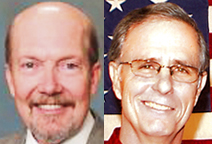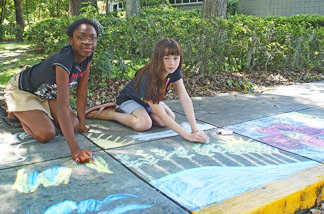 L-R: High Springs Vice Mayor Bob Barnas and Commissioner Scott Jamison, Sr.
L-R: High Springs Vice Mayor Bob Barnas and Commissioner Scott Jamison, Sr.
HIGH SPRINGS – Despite the call by High Springs city officials during the Thursday, June 14 commission meeting for a distinction between commissioner and charter-employee duties, an hour-long debate provided scant information.
On Friday, June 8, City Manager Jeri Langman called for Vice-Mayor Bob Barnas to resign because of his alleged activities that she said were outside of his charter authorized duties. Langman directed her complaints to Mayor Dean Davis, who instructed the city attorney, Raymond Ivey, to thoroughly read the City of High Springs Charter.
During the June 14 meeting, Ivey said, “This commission as a body, when it decides, when the majority decides on action, that is the action of the commission itself, and that is then ordered to the appropriate charter officer. But individually, the commissioners do not deal with any of the charter officers.”
Ivey clarified that each officer has the right to request information, such as water bill revenues, for the purpose of duties as a commissioner. However, the commission is not allowed to instruct the charter officers to take action.
“I’ve watched for years as commissioners up here have said we need to get that gazebo or direct staff to get that gazebo, or direct staff to get those benches moved somewhere, or direct staff to go take care of the tree that fell down,” Barnas said. “So what you’re saying is we have to bring that to a commission and vote on it?”
Items of attention can be brought before the city manager, Ivey said. However, under the express language of the Charter, commissioners do not have the authority under the Charter to direct staff.
Commissioner Scott Jamison said that under a city manager type of government, the manager is in charge of running the city, not the commissioners. The commission makes the policy, which the manager then carries out the tasks to set the policy in motion.
“Just because the people in the past did it doesn’t mean it’s right,” Jamison said. “That’s all we do up here - rip the people in the past, and now we’re saying because they did it, we want to be able do it. You do what the words say.”
Barnas read from the Charter stating the city manager is required to keep the commissioners apprised of all affairs of the city as he or she deems desirable. Barnas said if the city manager, city clerk or city attorney does not deem it necessary to tell one commissioner over the other, that becomes a problem.
“I think it’s becoming pretty clear I disagree with your interpretation of Section 2.06,” Barnas said to Ivey. “But it’s becoming clear that the Charter has some issues that this commission and maybe others didn’t address properly.”
“By leaving that paragraph in the Charter, it leaves it up to the city manager to decide who to tell. She can include or exclude any commissioner at her free will, and that’s wrong,” Barnas said.
Commissioners Sue Weller and Jamison both agreed that the city manager enforces policies based on the decisions made by the commission. The commission authorizes the budget, decides whether to raise fees and decides where the money goes, Jamison said.
“If we’re going to blame someone, we need to look in the mirror,” he said.
The explanation from the city attorney was crystal clear, Langman later said Monday. “I’m hoping that we will be able to move forward from here.”
On Monday, Barnas said the meeting left unanswered questions regarding commissioner and city manager duties that he feels still need to be resolved by charter amendments.
Also on Thursday’s agenda was an item to “discuss and make motions as needed for the City Attorney, City Clerk and City Manager.” However, Barnas said if the rest of the commissioners were happy with the performance of these officers, then the item could be skipped.
No one spoke up, and the item was dismissed.
# # #
Email awilliamson@alachuatoday.com



 L-R: Brianna King and Natalie Kempton, armed with colorful chalk, are transforming a Newberry sidewalk into an imaginative work of art. The youngsters are participating in the Newberry branch library’s summer reading program, which has a host of activities scheduled through the end of July.
L-R: Brianna King and Natalie Kempton, armed with colorful chalk, are transforming a Newberry sidewalk into an imaginative work of art. The youngsters are participating in the Newberry branch library’s summer reading program, which has a host of activities scheduled through the end of July.